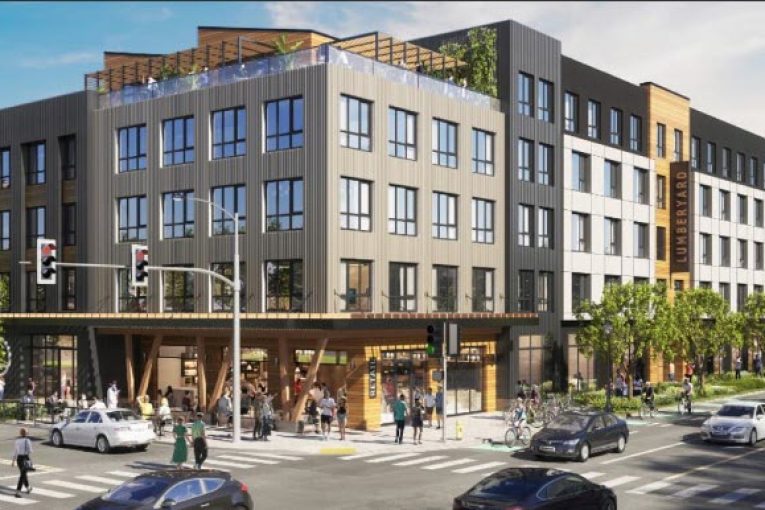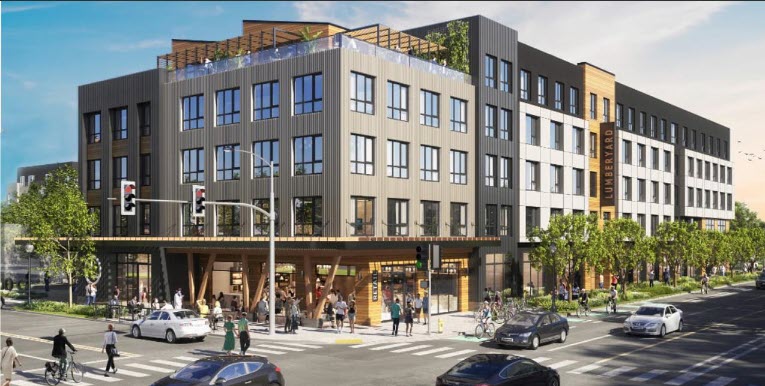

By David M. Greenwald
Executive Editor
Davis, CA – The other day on NextDoor there was a long discussion on one of the downtown projects—the big complaint being the fact that there was going to be no proposed parking at that spot.
Unfortunately, Nextdoor has since deleted the conversation—which is unfortunate because it illustrates a number of problems and challenges.
The first problem, of course, is that for Vanguard readers none of this is new. We have been discussing this issue for several years now and the proposal itself is probably half a year old. But that illustrates that people in the community aren’t paying attention to these issues—but that doesn’t mean they don’t have strong opinions.
A second problem is that this is not really a city of Davis issue. As we have pointed out in the past—near transit corridors, the state has eliminated parking minimums.
In November, the City Council went further, noting that, as of January 1, 2023, state law went into effect to end parking minimums near public transit.
According to the law, “a public agency shall not enforce any minimum parking requirements on a ‘residential, commercial or other development project’ located within one-half mile of public transit.”
The staff report notes, “Davis has a bus system that meets the objectives of this law and therefore, most of the city falls under the provisions of this law.” Therefore, “the state has eliminated parking requirements for the vast majority of the City.”
In addition, the city had a long public engagement process over the downtown plan.
The gist of all of this is that with state law and the city’s newly adopted downtown plan, most of these infill projects are not even discretionary and therefore the council lacks any authority to compel developers to add parking.
Sacramento’s recently adopted General Plan shows that this is the wave of the future.
For instance, as SACOG noted, Sacramento eliminated “a parking space requirement for new housing, providing developers far more flexibility as they design new projects.”
There are two factors here.
The first, “Parking can add tens of thousands of dollars to the cost of constructing new housing, and can be particularly detrimental to building large affordable housing developments.”
Everyone wants affordable housing, but cost issues make affordable housing prohibitive and one way to address that is to cut other costs such as… parking.
There is a second factor of course. Despite Davis’ reputation as a bike capital, we have an extremely car-centric community. People are really going to have a hard time getting past their car-centrism.
I was having a side discussion this week with a friend.
He told me, “This does impress upon me one thing: Just how difficult infill is and how hard it is going to be to create consensus over concepts that have been proposed like ‘densification of arterial areas.’”
He added, “Infill is preferred but infill is going to take a LOT OF TIME… both to build this consensus, but also for properties to turn over naturally…”
We have basically run out of open space within the city, so it will take owners to want to level their existing structures and densify.
But there’s a second problem… one of my concerns is calls for public process. It’s kind of twofold.
On the one hand, you have a strong divide in the community. You also have what we might call agents who are not wanting to be honest brokers and instead wanting to throw wrenches into the process.
But the second problem is that—as illustrated in the NextDoor discussion—you have people with strong opinions who are out of the loop and so even if you have public meetings and outreach, you might not reach them and then you have to backfill.
There is actually a lot of blame to go around here. I don’t think the city has done a great job of engagement. A lot of people more critical of city direction than myself have pointed this out and I think they are right.
My friend suggested running this almost as a campaign, but campaigns are time consuming, labor intensive and expensive.
But where I probably differ with some of the critics of the city—it’s not all on the city. Democracy is not a spectator sport. I think for too long we have taken our democracy for granted and now I think it is in great peril—we will see just how much later this year.
Citizens can’t say they are too busy with their everyday lives and then complain when stuff happens that they didn’t know about.
At the end of the day, though, the city should assume “that nobody is even TRYING to pay attention” aside from the 100 to 200 engaged “usual suspects” and run a full-blown campaign.
Part of my frustration has been that in areas of my concern—first the city finances and now more housing—I don’t think council necessarily thinks it is in their best interest to level with the voters about the reality of the situation.
For too long, we have had this slow decline. But the cost of living has crept up, it’s starting to impact schools, it’s starting to force middle class families out of this community and slowly over time the quality of life is going to decline. We see pockets of it already.
It is not too late to reverse things, but it requires education and engagement. Community groups can help fill this gap as well, and a number have propped up.
But now is the time to recognize this as we engage in a General Plan update.







I was guilty of getting sucked into that thread on ND… (not the first lengthy ND thread on this topic by the way). And what really was still surprising to me was really truly, how car-centric the thinking of a good number of our neighbors is, and how entrenched that thinking is.
Now, when you realize that single-family housing = car-served housing, and then you look at the zoning map of our city, you have no option but to admit that our “bike town” was in fact, ENTIRELY built to be used by cars…. so this realization that we have strong car culture despite the “bike” branding shouldn’t be too shocking… but the strength of the opinions, and the absolute un-wilingness to consider that other people MIGHT be willing to live without a car, was really striking.
Despite a number of people coming on saying things like ” I live downtown and haven’t needed a car for 20 years”… still other commenters were insistent: the people who live here ARE going to have cars, because everyone has cars, and that is just going to make parking worse..
I do think its an education problem, and its going to plague these processes for decades unless we raise some awareness of it.
The elimination of parking minimums is not easy to explain to people in a soundbyte. But there are resources out there about the topic, and I think that one of the things that quelled the complaints the most was Planning Commissioner Rowe, making a post saying “we have discussed this for 4+ years, did a lot of meetings and planning, and this change is mandated by state law”
Perhaps that message on this topic needs to be amplified specifically and deliberately by the city.
Yes, I know that there are extents to which such education is too expensive…. but we also cant do the opposite and have a notification process that is insufficient either.
Which gives me a perfect excuse to post one of my favorite vignettes from “the hitchikers guide to the galaxy” when alien contractors are about to blow up the earth so they can create a highway.
We cant err on THAT side of the notification / awareness spectrum either.
A separate thought that occurred to me in light of that discussion on next-door is this:
One of the things that I think there is consensus on, among the people who tend to be vocal on issues of growth in this city is we prefer “densification and infill” to peripheral sprawl. Everyone pretty much agrees that this is the way we would most like to grow as a city, if given a choice.
But most of the time, that argument only comes out as a rebuttal to a proposition to grow on the periphery.
That nextdoor thread had upwards of 160 posts on it before it dissapeared… and the voices ranged from people complaining about parking, to allegations of vast conspiracies, to people complainging about process etc…
“Densification and infill” is going to be REALLY REALLY hard for the city to process and execute upon, if this is who our voters are. Nobody wants a taller building near them… nobody…
So any general plan process that really tries to figure out how we densify our city is going to be an unpopular process to put it mildly.
The best way, I think for us to actually be proactive then with regards to promoting densification and a more walkable / bikeable / transit served city is for the general plan process to take a LONG time horizon into account…. like at least 30 years out.
If we tell the residents of a certain neighborhood that their block is going to be allowed to evolve into 4-5 story buildings, they are going to riot… ( Or like the movie “UP” the residents are going to tie hundreds of helium baloons to their house and sail away to paradise falls )
The more pragmatic and digestable approach is going to be to make those same zoning changes, but not have them go into effect for ~20 years… Given that the average amount of time a person owns a home is around 16 years… this gives everyone a chance to plan, and likely everyone’s house price goes up immediately in the interim.. win win.
We cant spend the general plan update debating the peripheral projects…. those projects are just what tides us over until densification maps start kicking in…. It really needs to be a long-term integrated process that considers all of the town as an integrated whole and how that whole evolves over 40 years.
My wife’s family is involved in a project in Los Angeles that has been in the works for two decades in a community about the size of Davis. Although it had an extensive public process and the City of LA has decided to move forward, some latecomers keep saying “but I haven’t had my say!” At some point the City has to tell those citizens the bad news that once a decision has been made to move forward through a fairly democratic process, it can’t be revisited unless there has been a catastrophic change in circumstances.